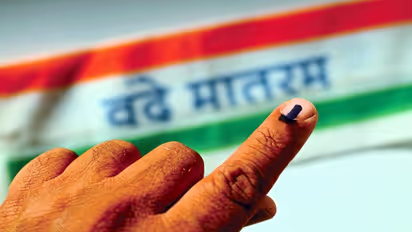Politics over 'one nation, one election': Oppn dubs it 'impractical', 'classic Modi-Shah jumla'; BJP reacts

Synopsis
Prime Minister Narendra Modi’s Cabinet on Wednesday approved a proposal for “one nation, one election,” a significant move aimed at synchronizing the Lok Sabha and state assembly elections.
Prime Minister Narendra Modi’s Cabinet on Wednesday approved a proposal for “one nation, one election,” a significant move aimed at synchronizing the Lok Sabha and state assembly elections. The government argues that this initiative, based on recommendations from a high-level committee led by former President Ram Nath Kovind, will reduce costs and logistical challenges in conducting elections in the world’s largest democracy.
Sources indicate that a bill regarding “one nation, one election” (also referred to as “one nation, one poll” or ONOP) will be introduced in the upcoming Winter Session of Parliament. Union Minister Ashwini Vaishnaw also revealed that the simultaneous elections will be carried out in two phases. The first phase will cover the Lok Sabha and state assembly elections, while the second phase will include local body elections, to be held within 100 days of the first phase.
Following this announcements, opposition parties voiced strong objections to the 'one nation, one election' proposal deeming it impractical and a mere political gimmick. Congress President Mallikarjun Kharge criticized the 'one nation, one election' proposal as impractical and suggested that the BJP introduces such ideas to distract from pressing issues as elections near.
"We don't stand with this. One nation, one election cannot work in a democracy. Elections need to be held as and when required if we want our democracy to survive," he added.
Congress leader Harish Rawat added, "This decision is a gimmick. They (BJP) can see their defeat in both Haryana and J&K. I have come to know that in an RSS camp, it was discussed that BJP will lose Maharashtra and Jharkhand elections also. To divert attention from this, a gimmick has been introduced. You can't impose this on a changed India. This is not in the favour of the country."
Meanwhile, Trinamool Congress (TMC) leader Derek O'Brien criticized the "one nation, one election" proposal as a "cheap stunt" by the BJP. He questioned why the Maharashtra elections were not scheduled alongside those in Haryana and Jammu and Kashmir if the government is truly committed to simultaneous elections.
“One nation, one election is just another cheap stunt by the anti-democratic BJP. Why were Maharashtra elections not announced along with elections in Haryana and Jammu & Kashmir?" O'Brien said.
"The Maharashtra government announced the Ladki Bahin scheme in the Budget this June. The first tranche reached the bank accounts of women in August and the second tranche will reach the beneficiaries in October," he said.
"You can’t do three states in one go and you talk about one nation, one election," he said.
He also questioned how many constitutional amendments and reductions in the terms of state assemblies would be necessary to implement simultaneous elections.
"And also tell us, how many constitution amendments, including curtailing or extending terms of state Assemblies, will be done! Classic Modi-Shah jumla,” he said.
Union Minister Ashwini Vaishnaw defended the proposal, arguing that a significant portion of public opinion, especially among the youth, supports the idea. He suggested that the opposition's criticism might stem from internal pressures or discomfort with the proposal’s potential implications.
"The opposition might start feeling internal pressure (about one nation, one election) as more than 80% of respondents who responded during consultant process have given their positive support, especially the youth, they are very much in favour of this," he said.
In his Independence Day address last month, PM Modi strongly advocated for 'one nation, one election,' arguing that the frequent elections were obstructing the country’s progress.
"The nation has to come forward for 'one nation, one election'," Modi had said in his address from the ramparts of the Red Fort.
The prime minister urged the political parties "from the Red Fort and with the national tricolour as a witness to ensure the nation's progress".
He also urged parties to ensure that national resources benefit the common people, stating, "We have to come forward to realise the dream of 'one nation, one election'."
'One nation, one election' was a major promise in the BJP's Lok Sabha election manifesto.
In March of this year, a high-level panel led by former President Ram Nath Kovind recommended initiating simultaneous elections for the Lok Sabha and state assemblies, followed by coordinated local body elections within 100 days.
Additionally, the Law Commission is expected to suggest holding simultaneous elections for all three levels of government—Lok Sabha, state assemblies, and local bodies such as municipalities and panchayats—beginning in 2029. The Commission may also propose a provision for a unity government in cases of a hung parliament or no-confidence motions.
The Kovind panel has not provided a timeline for implementing simultaneous elections but has proposed establishing an 'Implementation Group' to oversee the execution of its recommendations. The panel also recommended up to 18 constitutional amendments, most of which will not require ratification by state assemblies, though some constitutional amendment bills will need to be passed by Parliament.
Stay updated with the Breaking News Today and Latest News from across India and around the world. Get real-time updates, in-depth analysis, and comprehensive coverage of India News, World News, Indian Defence News, Kerala News, and Karnataka News. From politics to current affairs, follow every major story as it unfolds. Get real-time updates from IMD on major cities weather forecasts, including Rain alerts, Cyclone warnings, and temperature trends. Download the Asianet News Official App from the Android Play Store and iPhone App Store for accurate and timely news updates anytime, anywhere.